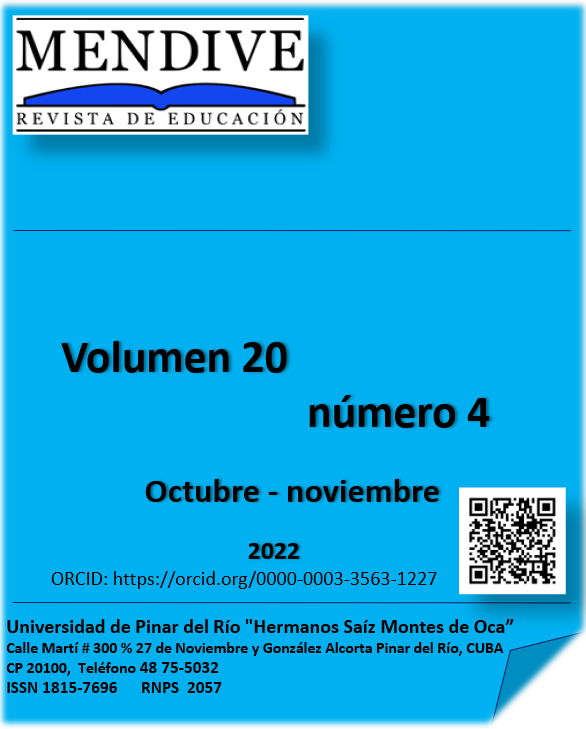Fundamentos cognitivos e pedagógicos da aprendizagem ativa
Main Article Content
Resumo
Downloads
Article Details
Referências
Balim, A. G. (2009). The Effects of Discovery Learning on Students' Success and Success and Inquiry Learning Skills. Eurasian Journal of Educational Research, 35, 1-20. Disponible en: https://www.academia.edu/2167480/The_Effects_of_Discovery_Learning_on_Students_Success_and_Inquiry_Learning_Skills
Boekaerts, M. (1997). Self-Regulated Learning: A new concept embraced by researchers policy makers, educators, teachers, and students. Learning and instruccion., 7(2), 161-186. Disponible en: https://www.sciencedirect.com/science/article/abs/pii/S0959475296000151
Bonwell, C. C., y Eison, J. A. (1991). Active Learning; Creating Excitement in the Classroom. ASHE-ERIC Higher Education Report No. 1. Disponible en: https://files.eric.ed.gov/fulltext/ED336049.pdf
Bruner, J. (1961). The act of discovery. Harvard Educational Review, 31(1), 21-32. Disponible en: https://psycnet.apa.org/record/1962-00777-001
Busch, J. T. A., y Legare, C. H. (2019). Using data to solve problems: Children reason flexibly in response to different kinds of evidence. Journal of Experimental Child Psychology, 183, Pages 172-188. Disponible en: https://www.sciencedirect.com/science/article/abs/pii/S0022096518303801?via%3Dihub; https://doi.org/10.1016/j.jecp.2019.01.007
Bush, J. T. A. , Willard, A., y Legare, C. (2018). Explanation Scaffolds causal learning and problem solving in chilhood. En M. Saylor, y P. Ganea, Active Learning from infancy to childhood (págs. 113-125). Springer International Publishing. Obtenido de https://doi.org/10.1007/978-3-319-77182-3_7
Catherine, L. E., Javier, B., y Francisco, G. (2020). Four Pillars of the Montessori Method and Their Support by Current Neuroscience. Mind, Brain, and Education, 14(4), 322-334. Disponible en: https://doi.org/10.1111/mbe.12262
Coenen, A., Nelson, J. D., y Gureckis, T. M. (2019). Asking the right questions about the psychology of human inquiry: Nine open challenges. Psychonomic Bulletin and Review, 26, 1548-1587. Disponible en: https://doi.org/10.3758/s13423-018-1470-5
Dewey, J. (2004). Democracy and education. An Introduction to the Philosophy of Education. Morata, Ed. (Publicación original 1916)
Di Biase, R. (2019). Moving beyond the teacher-centred/learner-centred dichotomy: implementing a structured model of active learning in the Maldives. Compare: A Journal of Comparative and International Education, 49(4), 565-583. Disponible en: https://www.tandfonline.com/doi/abs/10.1080/03057925.2018.1435261
Garcia, R., Falkner, K., & Vivian, R. (2018). Systematic literature review: Self-Regulated Learning strategies using e-learning tools for Computer Science. Computers & Education, 123, 150-163. Disponible en: https://www.sciencedirect.com/science/article/abs/pii/S0360131518301064
González-Rivera, J. A., Rosario-Rodríguez, A., Torres-Rivera, N., Ortiz-Santiago, T., Sepúlveda-López, V., Tirado de Alba, M., y González-Malavé, C. M. (2021). Incidencia Universitaria en las Actitudes hacia la Investigación: Adaptación de un Instrumento Breve. Revista Caribeña de Psicología, 5(e5809). Disponible en: https://doi.org/10.37226/rcp.v5i1.5809
Johnson, M. (2021). Cognitive science and Dewey's theory of mind, thought, and language. In Embodied Mind, Meaning, and Reason (pp. 37-56). University of Chicago Press.
Kolb, A., y Kolb, D. (2018). Eight important things to know about the experiential learning cycle. Australian educational leader, 40(3), 8-14. Disponible en: https://learningfromexperience.com/downloads/research-library/eight-important-things-to-know-about-the-experiential-learning-cycle.pdf
Kuhn, D., Black, J., Keselman, A., y Danielle Kaplan. (2000). The Development of Cognitive Skills To Support Inquiry Learning. Cognition and instruction, 18(4), 495-523. Disponible en: https://www.tandfonline.com/doi/abs/10.1207/S1532690XCI1804_3 Montessori, M. (1912). The Montessori Method. New York: Frederick A. Stokes Company. https://digital.library.upenn.edu/women/montessori/method/method.html
Morris, T. H. (2020). Experiential learninga systematic review and revision of Kolb's model. Interactive Learning Environments, 28(8), 1064-1077.
Nurdin, K., Muh, H. S., y Muhammad, M. H. (2019). The implementation of inquiry-discovery learning. IDEAS: Journal on English Language Teaching and Learning, Linguistics and Literature, 7(1). Disponible en: https://ejournal.iainpalopo.ac.id/index.php/ideas/article/view/734
Piaget, J. (1962). Play, dream and imitation. The international library of Psychology.
Rosario-Rodríguez, A., González-Rivera, J. A., Cruz-Santos, A., y Rodríguez-Ríos, L. (2020). Demandas Tecnológicas, Académicas y Psicológicas en Estudiantes Universitarios durante la Pandemia por COVID-19. Revista Caribeña de Psicología, 4(2), 176-185. Disponible en: https://revistacaribenadepsicologia.com/index.php/rcp/article/view/4915
Ruggeri, A., Markant, D. B., Gureckis, T. M., Bretzke, M., & Xu, F. (2019). Memory enhancements from active control of learning emerge across development. Cognition, 186 , 82-94. Disponible en: https://www.sciencedirect.com/science/article/abs/pii/S0010027719300162
Ruggeri, A., Swaboda, N., Sim, Z. L., & Gopnik, A. (2019). Shake it baby, but only when needed: Preschoolers adapt their exploratory strategies to the information structure of the task. Cognition, 193, 104013. Disponible en: https://www.sciencedirect.com/science/article/abs/pii/S0010027719301866
Oranç, C., & Ruggeri, A. (2021). Alexa, let me ask you something different Children's adaptive information search with voice assistants. Human Behavior and Emerging Technologies, 3(4), 595-605. Disponible en: https://onlinelibrary.wiley.com/doi/full/10.1002/hbe2.270
Schulz, E., Wu, C. M., Meder, B., y Ruggeri, A. (2018). Searching for rewards like a child means less generalization and more directed exploration. Psychological Science, 30(11), 1561–1572. Disponible en: https://doi.org/10.1177/0956797619863663 https://journals.sagepub.com/doi/abs/10.1177/0956797619863663
Sebesta, A., y Bray, E. (2017). How Should I Study for the Exam? Self-Regulated Learning Strategies and Achievement in Introductory Biology. Life Sciences Education, 16(30), 1-12. Disponible en: https://www.ncbi.nlm.nih.gov/pmc/articles/PMC5459248/
Sternberg, R. J. (2018). Theories of intelligence. New York: Cambridge University Press.
Ellizar, E., Hardeli, H., Beltris, S., y Suharni, R. (2018). Development of scientific approach based on discovery learning module. IOP Conference Series: Materials Science and Engineering, 335(1), p. 012101. Disponible en: https://www.researchgate.net/publication/324665599_Development_of_Scientific_Approach_Based_on_Discovery_Learning_Module
Vasilyeva, N., Ruggeri, A., & Lombrozo, T. (2018). When and How Children Use Explanations to Guide Generalizations. Cognitive development, 61, 101114. Disponible en: https://www.sciencedirect.com/science/article/pii/S0885201421001398
Vygotsky, L. S. (1978). Mind in Society: The Development of Higher Psychologcal Processes. Harvard University Press. pp.174 Disponible en: https://doi.org/10.2307/j.ctvjf9vz4
Watson, J. B. (1913). Psychology as the behaviorist views it. Psychological Review, 20(2), 158–177. Disponible en: https://doi.org/10.1037/h0074428.
Young, M. F., & McNeese, M. D. (2018). A situated cognition approach to problem solving. In Local applications of the ecological approach to human-machine systems (pp. 359-391). CRC Press.
Zheng, L., Li, X., Tian, L., & Cui, P. (2018). The effectiveness of integrating mobile devices with inquiry-based learning on students' learning achievements: a meta-analysis. International Journal of Mobile Learning and Organisation, 12(1), 77-95. Disponible en: DOI:10.1504/IJMLO.2018.089238


